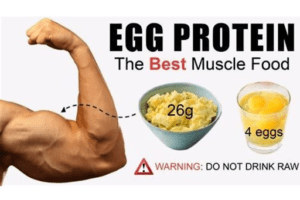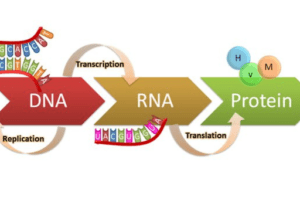Eggs are a versatile ingredient enjoyed worldwide. But beyond their delicious taste, they offer a surprising amount of protein, a crucial building block for our bodies. Let’s dive into the protein content of eggs and see how much you can get from a single serving.
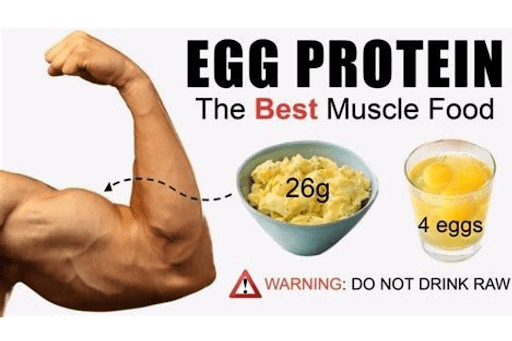
On average, a large egg packs a whopping 6 grams of protein! This can vary slightly depending on the size you choose.
- Small Egg (around 38 grams): Expect roughly 4.8 grams of protein.
- Medium Egg (around 44 grams): You’ll get approximately 5.5 grams of protein.
- Large Egg (around 50 grams – most common): This size offers a solid 6.3 grams of protein.
- Extra Large Egg (around 56 grams): These provide around 7.1 grams of protein.
- Jumbo Egg (around 63 grams): Get ready for a protein powerhouse with nearly 8 grams!
Even a small egg delivers a significant amount of protein, making them a budget-friendly choice. But the protein story doesn’t end there! The white holds the larger share, while the yolk offers a smaller amount alongside other benefits like healthy fats and essential vitamins.
So, the next time you crack open an egg, remember you’re grabbing a convenient and nutritious source of protein to keep you energized throughout the day.
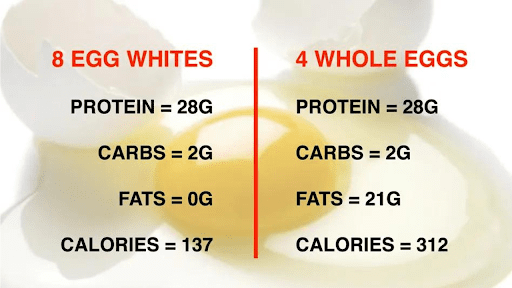
How much protein is in 4 eggs?
Sure, there are approximately 25.2 grams of protein in 4 eggs.
Here’s the breakdown:
- Protein in one large egg: 6.3 grams
- Number of eggs: 4
- Total protein: 6.3 grams/egg * 4 eggs = 25.2 grams
This is a great way to add protein to your diet, whether you’re enjoying them for breakfast, lunch, or dinner. Eggs are a versatile ingredient that can be cooked in many different ways, so you can easily find a way to fit them into your meals.
Is eating 4 eggs a good source of protein?
Cracking open four eggs can be a delicious way to start your day, but how does it stack up protein-wise? You’ll be happy to know that four eggs deliver a significant protein punch!
Here’s the breakdown:
- Protein per Large Egg: Around 6 grams
- Number of Eggs: 4
- Total Protein: 6 grams/egg * 4 eggs = approximately 24 grams
With roughly 24 grams of protein from four large eggs, this breakfast choice becomes a protein powerhouse. But before you go all-in on a four-egg omelet every morning, let’s explore some factors to consider.
Why 4 Eggs Can Be a Protein Champion:
Complete Protein
Eggs are a complete protein source, containing all nine essential amino acids your body can’t produce on its own. These building blocks are crucial for muscle repair, tissue growth, and various bodily functions.
High Bioavailability: The protein in eggs is readily absorbed and utilized by your body, making it a high-quality source.
Affordability and Versatility: Eggs are a budget-friendly protein option and can be prepared in countless ways, making them a dietary staple for many.
Individual Needs: Protein requirements vary based on factors like age, activity level, and goals. While 24 grams from eggs might be ideal for someone needing a protein boost, it could be excessive for others.
Dietary Balance: Eggs excel in protein, but they don’t offer a complete nutritional picture. Include other protein sources and a balanced diet alongside them for optimal health.
Cholesterol: Egg yolks contain cholesterol. For most healthy individuals, moderate egg consumption (including yolks) isn’t a major concern. However, if you have specific cholesterol concerns, consult a doctor or registered dietitian for personalized advice.
How much protein is in an egg white?
Egg whites are a popular choice for those seeking a low-fat, low-calorie protein source. But how much protein does a single egg white actually pack?
This might seem lower compared to the whole egg (around 6 grams), but it’s still a significant amount considering the minimal calories and fat content.
Here’s a breakdown of the protein content in an egg:
- Large Egg White: 3.6 grams
- Large Whole Egg: 6 grams (including both white and yolk)
Why Choose Egg Whites for Protein?
Low in Calories and Fat: Egg whites are a fantastic option for those watching their calorie intake. They contain almost no fat and only around 17 calories per large white.
Pure Protein: The protein content in egg whites is concentrated, with minimal other nutrients present. This can be appealing for those specifically aiming to boost protein intake.
Allergy-Friendly (Sometimes): For some individuals with egg allergies, egg whites may be tolerated better than whole eggs due to the lower concentration of certain allergens found in the yolk. However, it’s crucial to consult a doctor before trying egg whites if you have an egg allergy.
Limited Nutrients
While rich in protein, egg whites lack the vitamins, minerals, and healthy fats found in the yolk. Aim for a balanced diet that includes other protein sources for a broader range of nutrients.
Taste and Texture: Egg whites are known for their bland taste and slightly rubbery texture. Experiment with herbs, spices, and cooking methods to enhance their flavor and make them more enjoyable.
Overall, egg whites can be a valuable tool for those seeking a concentrated protein source that’s low in calories and fat. However, remember to prioritize a balanced diet that incorporates other protein sources for a wider range of nutrients.
How much protein is in an egg yolk?
Egg yolks often get overshadowed by the protein powerhouse reputation of egg whites. But don’t underestimate this golden orb! While the white takes the lead in protein content, egg yolks still contribute a valuable amount.
While this might seem lower than the white’s 3.6 grams, it’s still a significant protein contribution, especially considering the yolk’s compact size.
- Large Egg White: 3.6 grams protein
- Large Egg Yolk: 2.7 grams protein
- Large Whole Egg: 6.3 grams protein (combines white and yolk)
Complete Protein Source
While lower in total protein than the white, egg yolks contribute to the whole egg being a complete protein source. This means it contains all nine essential amino acids your body can’t produce on its own.
Bioavailability Boost: The protein in egg yolks is highly bioavailable, meaning your body can easily absorb and utilize it.
Vitamin and Mineral Powerhouse: Egg yolks are packed with essential vitamins and minerals like vitamin A, choline, and healthy fats, making them a valuable addition to a balanced diet.
Cholesterol
Egg yolks contain cholesterol. For most healthy individuals, moderate egg consumption (including yolks) isn’t a major concern. However, if you have specific cholesterol concerns, consult a doctor or registered dietitian for personalized advice.
Calories and Fat
Egg yolks are higher in calories and fat compared to egg whites. This can be beneficial for some seeking a satiating breakfast, but moderation is key for those watching their calorie intake.

Egg yolks offer a respectable protein contribution along with a wealth of essential vitamins and minerals. While moderation is important for some, including yolks in your diet can enhance the overall nutritional value of your eggs.
How many eggs do I need to eat to get X grams of protein?
Eggs are a fantastic way to boost your protein intake, but how many do you need to reach a specific protein goal? Here’s how to do the math:
- Identify Your Protein Goal:
First, determine the amount of protein you’re aiming for. This can depend on several factors like your age, activity level, and overall health goals.
- Know Your Egg Size:
The protein content in eggs can vary slightly depending on their size. Here’s a general guideline:
- Large Egg: Around 6 grams of protein
- Medium Egg: Around 5.5 grams of protein
- Small Egg: Around 4.8 grams of protein
- Do the Math:
Once you know your protein goal and egg size, simply divide your goal by the protein content per egg.
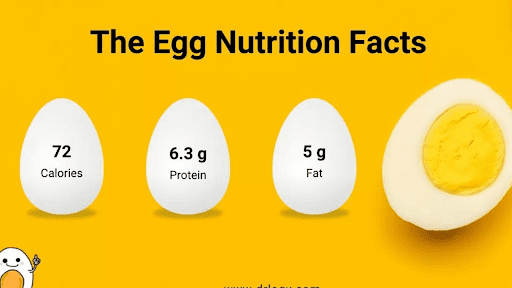
For example, if you want 20 grams of protein and are using large eggs (6 grams each):
- Protein Goal (grams) / Protein per Egg (grams) = Number of Eggs
- 20 grams / 6 grams/egg = 3.33 eggs
Since you can’t eat part of an egg, round up to the nearest whole number:
- You would need to eat 4 large eggs to reach your 20-gram protein goal.
Remember:
- This is a general estimate.
- Adjust the calculation based on the specific size of your eggs and your individual protein needs.
- Consider other protein sources throughout your day for a balanced diet.
Tips:
- If you’re unsure about your protein needs, consult a doctor or registered dietitian for personalized advice.
- Many online calculators can help you determine your daily protein requirements based on your individual factors.
By following these steps, you can easily figure out how many eggs you need to crack open to reach your protein goals and fuel your day!
